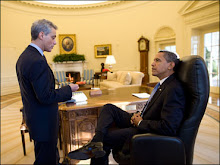for the "land of the oppressed, and home of the fearful..."
Plato's Republic: This book taught me above all the connection of the mechanics of politics and human nature to invisible but eternal ideals of justice and liberty.
The Federalist Papers by Hamilton, Madison & Jay: This book taught me the necessity of balancing the powers of government against themselves to assure that those governed retain their liberty against one monolithic state. *As a tiny extra, include George Washington's simple but elegant Farewell Address- more than prescient considering his two main points foreign and domestic which remain the bain of our republic's existence: unnecessary foreign entanglements and excessive partisanship, both subjugating the common good to quests for power and endangering our future survival.
The Road To Serfdom by Friedrich Hayek: This book convinced me of the complete failure of a world view of economic interventionism and the importance of individual liberty in the era of modern centralized government power whether at home or abroad.
In Defense Of Freedom by Richard Weaver: The single most influential book of my academic education which raises up the individual against the power of the state by illuminating the concept of freedom in a way that ties together politics, philosophy, religion and the social good- utterly brilliant- and I return to its ideas again and again as it (in a similar way to the best of Hayek) elevates a more "libertarian" political economy above the conservatism of our day which is dominated by excessive corporatism, militarism and religious fundamentalism.
Shakespeare: The Invention Of the Human by Harold Bloom: This book is a more recent favorite as it explores all the plays of William Shakespeare to define the quintessential Western personality comprised of the need for freedom, spiritual meaning and personal intellectual examination of the self and the world to influence decisions.
Subscribe to:
Post Comments (Atom)


































.jpg)
.jpg)


























.jpg)




















































































































































(2).jpg)
















































































































.jpeg)










































No comments:
Post a Comment